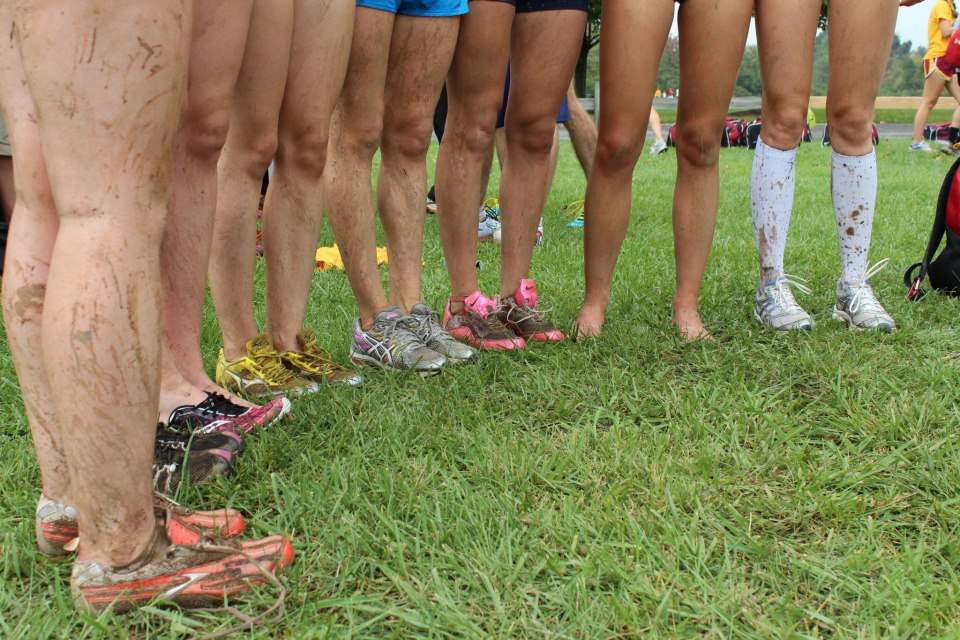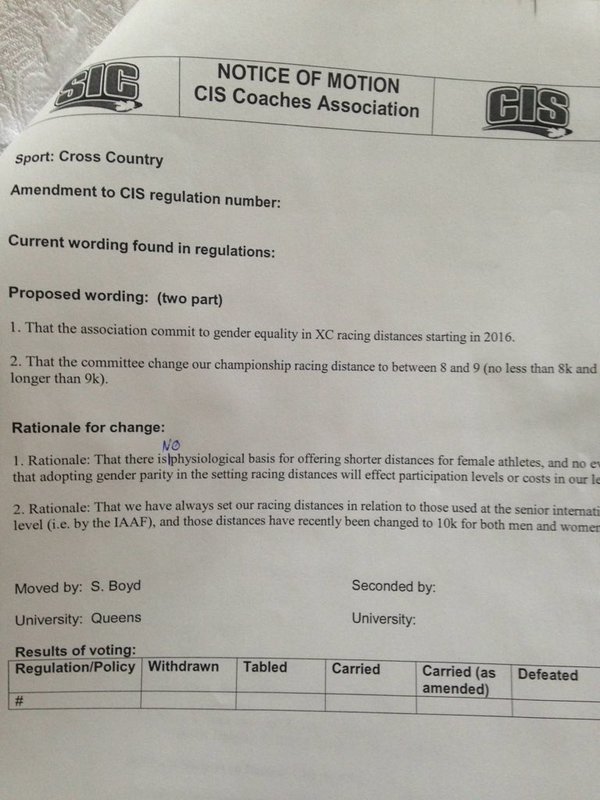Coaches debate equalizing men and women’s race distances, one sends in quotes from the meeting

There has been quite a large gender debate going on in cross-country at the Canadian university level this fall. While the CIS Championships were held in Guelph last weekend, wrapping up the season for Canadian university athletes, news from this part of the running scene continues to unfold.
In case you missed it, there has been much debate over why men and women athletes in the CIS run different distances (men race 10K while the women run on a 6K course). This exists at the high school level across Canada as well.
On an international scale, the same issue exists at the world cross-country championships. It was examined this fall by the IAAF. The body decided that the senior men’s and women’s race distances will be the same length for the next meet held in 2017 in Uganda. Junior distances remained the same.
With regards to the CIS, Steve Boyd, coach from Queen’s University put forward the following motion for head coaches in Canada to vote on:
“The association [Canadian Interuniversity Sport] commit to gender equality in cross-country racing distances starting in 2016.”
That meant that women and men would run the same distance. It was shot down with 13 votes against it and seven in favour. Three abstained.
Canadian Running reached out to the coaches involved to ask how they voted and why. We published statements from those who responded.
Since then, one coach who was at the meeting has sent in quotes taken from coaches as they spoke at the panel. They are published below.
Editor’s note: All of these quotes are alleged. Canadian Running was not present at the discussion. Our source (who requested they remain anonymous) says that two women were present and speaking at the meeting. Notes sent in have been edited for clarity. Minutes were taken at the meeting, but have yet to be made public.
Dave Scott Thomas (Guelph): Wants both to be 10K and thinks it’s best for long term development of the athletes. Mentions that most people haven’t read the actual LTAD and even if they have, it’s outdated.
Dick Moss (Laurentian): We are primarily junior athletes and so we should be catering to them. A small percentage (one to three per cent) of our athletes continue on internationally, so why should we be focusing on preparing them for such? We should be focused on participation. We have a system that is ours. It doesn’t matter what other systems do, we need to do what’s right for us.
Becky Pieterson: Says the women she has talked to don’t feel discriminated against. She is non-committal on the distance change
Steve Boyd (Queen’s): Nobody asked the boys what they wanted to race, so why should we ask the girls? We need to do what’s right for the athlete’s development.
Gary Malloy (Windsor): Questions if we should change it when other jurisdictions do.
Chris Moulton (associate coach, Guelph): Phasing it in would be the best way. Also if we are going to have gender equity in racing shouldn’t we have gender equity in FISU coaching? (the group agrees)
Steve Boyd: “Lower jurisdictions change based on higher jurisdictions. Now the IAAF has changed, we need to as well.”
Rich Lehman (Dalhousie): “If the girls only run 22-minute races, how do we turn them into distance runners?”
Mark Bomba (Trinity Western): Talks about keeping females in the CIS vs. NCAA States that Fiona Benson’s training for world cross-country didn’t hurt her spring track times at all.
Dennis Barrett (McGill University): “There are other opportunities for women to try out distance. Canada Running Series, road racing etc. Why do we need to do it here at the CIS level?”
Steve Boyd: “Two years ago, when the west wanted to move the guys race to 8K, we didn’t go to a committee to ask the boys what they wanted. We as coaches said it is better for middle and long-distance development for our athletes to run 10K. So why now do we think we need to ask the girls?”
Dave Scott Thomas: “Women will benefit from 10K. [Says he doesn’t want to see 8K.] We shouldn’t be reactive and we should do what’s right for women now.” [Adds that we need to better coach our female athletes.]
Bernie Chisholm (St. FX): Says he won’t have enough females if it moves up. Says he has a hard enough time to fill his team currently. Someone argues: “Then wouldn’t you have the same problem if the race was 10K? What’s the difference?” Chisholm says the females should be the ones to decide what they race.
Brant Statchel (Queen’s): “If cross-country was a new sport that was created tomorrow and we had to decide upon the race distance, knowing already that we have gender equality in terms of distances run on the road and the track (up to and including the marathon), would we even be discussing the option of there being different race distances for each sex?”
— A few people say good point. No further discussion on this question is raised.
Mark Bomba: “The physiology between men running 10K and women running 8K takes a similar amount of time so therefore similar aerobic loads. This is what we should be doing.”
Dennis Barrett: “The league is too weak to move up.”
Bryan Stride (Waterloo): “I lost five girls, as it was too much time to train for the 5K.”
Steve Boyd: “But you didn’t lose guys training for the 10K?”
Dick Moss: “Most of our athletes stop running when school is done.”
Drew Carver (MacEwan University): “Girls’ and guys’ steeple heights are different so there is precedence for having differences in sport for men and women.”
Dick Moss: Mentions that there is a difference in equality and equity. Boyd then says in this case, equity is equality.
First motion is then presented as worded in the original motion.
Coaches vote: 13 against, seven in agreement, three abstain.


